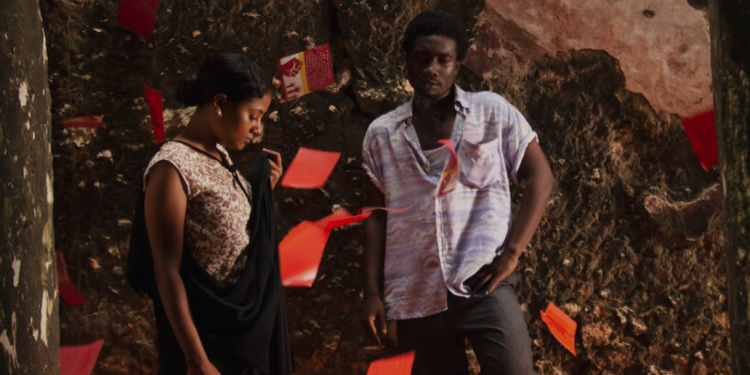Vuta N’kuvute (Tug of War) is one of a very limited collection of films to be shot on the tiny island of Zanzibar, along the coastline of the Indian Ocean. It’s also the first Tanzanian feature film to ever screen at Toronto International Film Festival (TIFF). Most recently, it was selected as Tanzania’s entry to the 2023 Oscars Best International Feature category, the country’s second-ever entry and the first one in 21 years (Maangazi: The Ancient One, released in 2002, was Tanzania’s first entry).
Vuta N’Kuvute’s mere existence is ground-breaking in its own right, yet every second of the film feels woven with a care and tenderness that exalts it as a phenomenal piece of visual art that just might set a precedent for films in Tanzania and East Africa, and even further.
Set in the 50’s colonial-era Zanzibar, Vuta N’kuvute is a story of a young freedom fighter, Denge (Gudrun Columbus Mwanyika), consumed with a dream to free his people, who meets a runaway bride, Yasmin (Ikhlas Gafur Vora) who is also finding her own version of freedom. The two are in their own blossoming war against the backdrop of a political uprising at the height of British colonial rule. It’s based on a Swahili award-winning novel by Shafi Adam Shafi of the same name, written in the 70s and published in the late 90s, decades away from the film’s release. It feels like a portal into a time wiped from our history books yet still recognisable enough in our present times.
I love details in a film, the world happening in and around the main characters, and Vuta N’Kuvute has enough details to rattle my eyes the whole way through. The extras are all going through their own little adventures, with every dance, conversation, and interaction in the background, proving they’re just as important to the story as the leads. The few who get to fight their way into dialogue add genuinely funny moments to the film. All this to the tune of a Swahili dialect that seems familiar yet foreign even to those of us who claim to speak it. It truly feels like a genuine Zanzibari culture is transpiring in front of our eyes, not the ones in history books, but one that most likely happened in those streets all those decades ago, with all their flaws and beauty.

The cinematography brings all this to greater heights. Filmed from the first minute with lush red, blue, and gold exactly where it feels right, whether to show the difference in class, or the decay of the walls, there are countless frames that would tell biblical and painterly imagery all on their own. All of this based on skin, mannerisms, and people so akin to us. Infused within the fabric of the frames, Vuta N’Kuvute feels like an homage to In the Mood for Love, the slow motion (and the slow-motion) creating raw emotions where there doesn’t need to be dialogue. The direction of Amil Shivji and the cinematography of Zenn van Zyl really come to full strength in this film. Then the music sips in; jazz-infused taarab music and hallowed ballads that serenade the ears. Shout out to the original score by Amélie Legrand and Amine Bouhafa.
Vuta N’Kuvute doesn’t shy away from itself either. It knows what it wants to be. Both as a celebration of a culture, an opportunity for those most familiar with the story to see themselves on screen, and a reflection of how similar we still are to the people within the narrative. The difference in races, classes, ideologies and passed down cultures and values like the roles of women and oppression and more importantly, the fight for our home and the people we love are wafted into the story, to start conversations and introspection.
I thought this was an absolutely well-made film in every sense. However, in the same sense that I understand not enough people have watched a movie like In the Mood for Love, I understand the Vuta N’Kuvute might not be for everyone. The pacing might be too slow, and the dialogue doesn’t build the relationships on the screen to flesh them out enough. To paraphrase someone in our Q&A session with Director Shivji after the screening, Kenyans don’t like foreplay, I still strongly think this film should be seen at least once by everyone who can. If not for anything else, just to know a few types of bread.
Vuta N’Kuvute will be screenings at unseen theatre during the course of the month in Nairobi, and there will be other screening in Lamu and Mombasa. Do yourself, and the people you know, a favour of watching this while you still can.
Enjoyed this article?
To receive the latest updates from Sinema Focus directly to your inbox, subscribe now.











